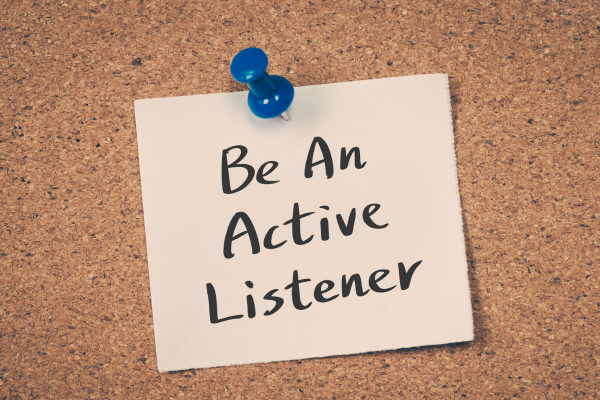In the intricate tapestry of a life and parenting partner, there exists a profound power, often overlooked yet undeniably transformative—the power of listening. The essence of a deep and meaningful connection unfolds within the realms of this silent but profoundly impactful act.
In its most accurate form, listening is the commitment of your undivided attention to your partner. It’s a conscious choice to be present in the moment, putting aside the noise of your thoughts, worries, and to-do lists. In those moments, you are not merely hearing words; you are actively seeking to understand the unspoken emotions, nuances, and vulnerabilities beneath the surface.

When you listen with your heart wide open, you’re signaling to your partner that they are your priority at that moment. It’s an eloquent declaration that their thoughts, feelings, and experiences matter deeply to you. This undivided attention is the most profound display of respect one can offer, a cherished gift that transcends words.
In the sacred space of listening, a remarkable alchemy takes place. Your partner begins to feel seen, heard, and valued. They sense that you are not just hearing them but truly listening, embracing their words with acceptance and empathy. This act, in itself, is a potent motivator for them to share even more. It encourages them to open up, reveal their heart’s inner workings, and entrust you with their most profound thoughts and emotions.
Here are some practical tips and strategies to help you and your spouse enhance your listening skills:
Be Present: When your partner speaks, make a conscious effort to be fully present. Put away distractions like phones, tablets, or the TV, and focus your attention entirely on your spouse. This sends a clear signal that you value their words and opinions.
Maintain Eye Contact: Eye contact is a powerful non-verbal cue showing engagement and listening. It conveys warmth and attentiveness, making your partner feel heard and validated.

Practice Empathy: Try to understand your partner’s perspective by placing yourself in their shoes. Empathize with their feelings, even if you don’t necessarily agree with their point of view. Reflecting on their emotions or paraphrasing what they’ve said can show that you’re tuned in.
Use Non-Verbal Cues: Nodding, smiling, and other positive non-verbal cues can encourage your spouse to continue sharing. Your body language can convey warmth and receptiveness.


Avoid Interrupting: Avoid interrupting or finishing your spouse’s sentences. Let them express themselves fully before responding. Interruptions can derail the flow of conversation and make your partner feel unheard.
Give Feedback: After your partner has spoken, provide feedback to confirm your understanding. Say things like, “I hear you saying that you felt frustrated because…” or “It sounds like you had a great experience when…”
Practice Active Listening Skills:Active listening involves hearing words and paying attention to tone, body language, and emotions. It’s about understanding the deeper meaning behind the words spoken. It may be easier to begin practicing with someone other than your partner. No matter how you apply your newfound listening skills – everyone will appreciate it fully.
Ask Open-Ended Questions: Instead of asking yes-or-no questions, ask open-ended questions that encourage your spouse to share more. Generally, open-ended questions begin with “what” or “how.” For example, instead of saying, “Did you have a good day?” you can ask, “What was the highlight of your day?”

Take Turns:
- Balance the conversation so that you and your spouse have equal opportunities to speak and be heard.
- Avoid monopolizing the conversation or making it one-sided.
- At the same time, be careful not to jump in immediately when you believe they have finished.
Sometimes, a pause permits them to continue with thoughts they may have been concerned about saying previously. Confidence can grow in a moment of silence.
Avoid Judgment:
- Create a safe space for your partner to express themselves without fear of judgment.
- Even if you disagreeing with their perspective, refrain from criticizing or belittling their feelings.
- Do your best to avoid asking “why” questions, which can immediately put the other person on the defense.
Practice Mindfulness: Mindfulness techniques can help you stay present and focused during conversations. Meditation and deep breathing exercises can improve your ability to listen without distraction.
Seek Clarification: If you’re unsure about something your spouse said, don’t hesitate to ask for clarification. It shows that you’re genuinely interested in understanding them.

Set Aside Time for Conversations: In the busyness of daily life, it’s easy to overlook meaningful conversations. Schedule regular times to talk with your spouse, whether over dinner, during a walk, or before bedtime. This dedicated time allows for open and uninterrupted communication.
Apologize and Forgive: If you’ve been a less-than-attentive listener in the past, acknowledge it and apologize. Likewise, forgive your partner if they’ve made similar mistakes. Creating a forgiving atmosphere encourages open communication.
Attend Couples Counseling: Sometimes, seeking professional guidance through couples counseling can be helpful. A therapist can provide insights and techniques tailored to your specific relationship dynamics.
Remember that developing strong listening skills is an ongoing process. It requires patience, practice, and a genuine desire to improve your connection with your spouse. When both partners try to listen and be heard, it can lead to a more fulfilling and harmonious marriage.
So, as you navigate the intricate landscape of life and parenting, never underestimate the transformative power of listening. It is not a passive act but a vibrant force that breathes life into your relationships. Through the simple yet profound art of listening, you create a haven of acceptance and understanding. In this sanctuary, the most profound connections are forged, where love and trust flourish, and where the beauty of each other’s souls is cherished.

Stay tuned for more insights on strengthening the bonds that matter most in your life. As you strengthen these bonds, your children learn to have successful relationships.
Other articles in this series:
Get Curious: Do You Know Your Partner?
The Art of Asking Questions in Marriage: Building Deeper Connections
I invite you to sign up for our newsletter. It is a great way to get the Virtue of the Month and tips on relationships, parenting, and self-care. In addition, you’ll be the first to know about upcoming classes for successful families.
To sign up, visit the “Newsletter” section here on the website. Enter your email address, and you’ll receive our newsletter in your inbox on Wednesdays. I appreciate your interest in bringing out the best in your children and yourself. We look forward to keeping you informed through our newsletter!

